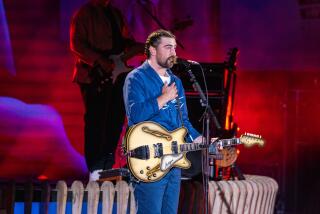Still in Fashion After 15 Years
- Share via
Only eight months after Depeche Mode’s singer David Gahan injected a near-fatal mixture of heroin and cocaine at a hotel in West Hollywood, the English band is back with a new single and an album on the way.
It’s more than even the most optimistic fans of the veteran group would have ever imagined.
Even Gahan’s bandmates feared that the synth-pop trio had reached the end of the line, after selling more than 25 million albums worldwide and growing so popular in Los Angeles that it was able to headline shows at the Rose Bowl in 1988 and Dodger Stadium in 1990.
“Oh, definitely,” says Andy Fletcher, who was home in London when he and bandmate Martin Gore heard the reports about Gahan from Los Angeles. “When we got the news, we just thought there was absolutely no way that he’d be able to get it together.”
Less than a year before his overdose, Gahan had slit his wrists in a suicide attempt. But now, the singer is said to be clean and sober, and the group’s new single, “Barrel of a Gun,” is due in stores Tuesday from Reprise Records. It already is closing in on the Top 10 in Billboard magazine’s list of the hottest songs on “modern rock” radio. The album, “Ultra,” arrives April 15.
“It’s an absolutely amazing transformation,” Fletcher says of Gahan’s recovery. “He’s solved a lot of his problems and his life is really looking up at the moment.”
“He’s a completely different person,” adds Gore, who writes all the band’s material.
But don’t look for the band at your local arena or amphitheater before next year.
“Dave’s not physically strong enough to tour yet,” says Fletcher of the singer, who wasn’t available to be interviewed. “It would be a major mistake to go on the road, where you’re away from your safety net and away from the people you love.”
Instead, Depeche Mode will watch from the sidelines to see how its latest batch of techno songs will fare with a U.S. audience that is much more accepting of this type of music than it was when the group debuted more than 15 years ago.
“When we first came to America in 1982, it was like we were a circus act,” Gore recalls. “We’ve been carrying the flag for electronic music for a long time.”
Both he and Fletcher say they feel vindicated by the recent surge in the popularity of electronic music, especially in England, where it has spawned everything from the ultra-high-beat-per-minute techno mixes of Prodigy to the ambient hip-hop stylings of Portishead.
“If you play a style of music that is supposed to be out of fashion and then a lot of other groups come ‘round to it, of course you’re proud,” Fletcher says. “This was our whole thing in the ‘80s, but it was odd to a lot of media and to radio [programmers] because they didn’t see it as proper music.”
More to Read
The biggest entertainment stories
Get our big stories about Hollywood, film, television, music, arts, culture and more right in your inbox as soon as they publish.
You may occasionally receive promotional content from the Los Angeles Times.










